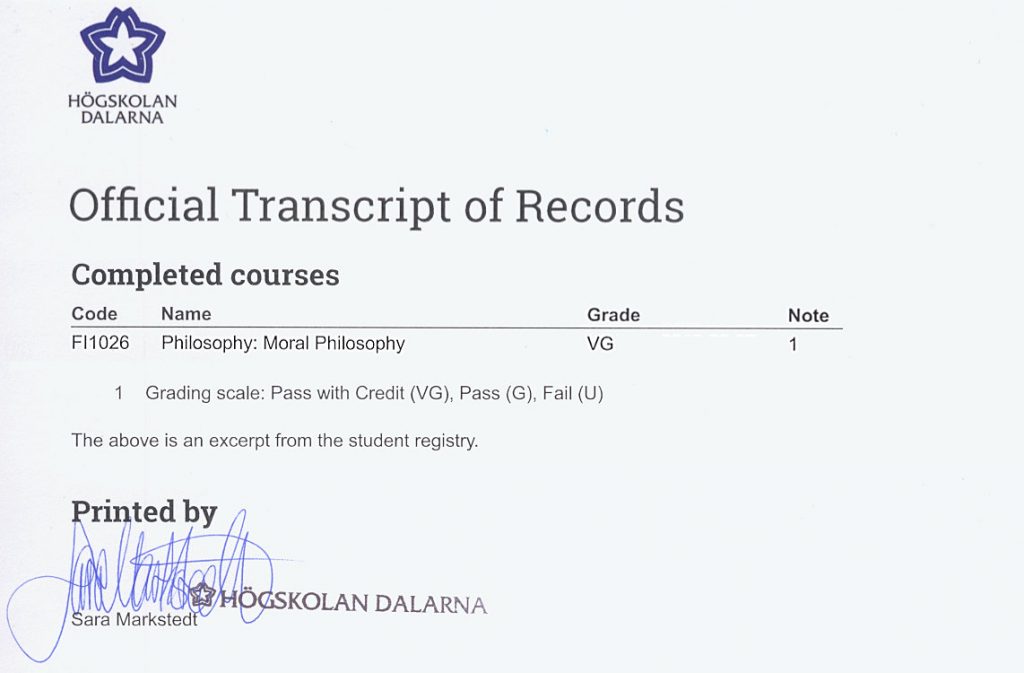
Enhancing our morality with knowledge has been discussed in the last two updates. I also mentioned that I had attended a course called “Moral Philosophy” at the university some time ago. My final exam from that course had one point, where I was asked to discuss my thinking on morals, ethics and intentions…

Alhamdulillah, I can proudly say that I received the highest grade. Does that make me an expert on the topic? Haha, no no… I am only human and make mistakes. But I feel I learned to look more analytically, to become more aware and try to see why we do or say something, and consider the benefit of it. Since that is something we should consider on our path to Jannah, it gave me the idea to write an input about “intentions” here. How can we judge if our intentions are good or bad?
Some good aspects to consider in this are…
* Self-Reflection. Related to self-awareness. We might wish to ask ourselves why we are intending to do something. Is it for personal gain, to help others, to prove something, or out of fear or anger? Understanding the root of it can help determine if our intention is good. But we should be honest with ourselves about our true motivations. It’s easy to convince ourselves that our intentions are good when they might not always be that way.
* Intent vs. Action. Sometimes good intentions can lead to bad outcomes, (or the other way around). It’s important to consider not only the intention but also the possible result of our actions.
Example Scenario:
So, this is an example to give a general idea. If we intend to give someone feedback to help them improve, we might ask ourselves:
- Am I doing this to genuinely help them or to feel superior? (With this action, do I want to show them that I am better than them?)
- How will they likely feel receiving my feedback? (That also depend on who we are to them, and on the way we present our feedback.)
- What could be the positive and negative outcomes of the feedback? (Will they be happy or sad? Angry?)
سورة البقرة ٢٦٣
قَوۡلٞ مَّعۡرُوفٞ وَمَغۡفِرَةٌ خَيۡرٞ مِّن صَدَقَةٖ يَتۡبَعُهَآ أَذٗىۗ وَٱللَّهُ غَنِيٌّ حَلِيمٞ
Surah Al-Baqara 2:263
Kind words and the covering of faults are better than charity followed by injury. Allah is free of all wants, and He is Most-Forbearing.

A good point to consider in this is what I wrote in the input “The path of humility“:
“Always see the world through your own flaws first, before you see them in others. In that sense, we might be able to see the world through a whole different light, forgive people who wronged us more easily, and become more grateful for the favours He has given us, inshallah.” Indeed, that is something that may lead us on the path. In real-world situations, both intentions and consequences are often considered. After all, we often judge people not just by what they do but also by why they do it.
That is a practice that we should adopt with ourselves first and foremost. This is, again, why self-awareness is such an important step. We learn.
سورة البقرة ٢٦٩
وَمَن يُؤۡتَ ٱلۡحِكۡمَةَ فَقَدۡ أُوتِيَ خَيۡرٗا كَثِيرٗاۗ
Surah Al-Baqara 2:269
and whoever is given wisdom has been given much good

We will continue to talk more on this topic next time inshallah. For now, I would like to wish everyone a beautiful time and hope that you found this an inspiring input and that it has brought something to consider. Jumma Mubaraka everyone. My best and most beautiful wishes, from the heart.
The best of times to you all inshallah.
Peace, happiness, and stay faithful.